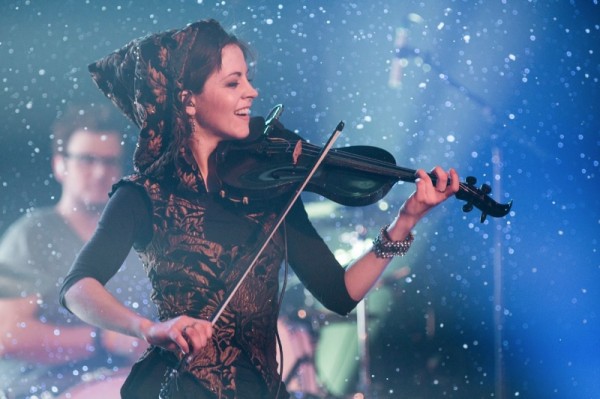A CHAT WITH: LINDSEY STIRLING
aaamusic | On 30, Jul 2014
Lindsey Stirling, the ‘dancing violinist’, is a composer and violinist who performs outstanding choreographed performances, both live and in music videos. Her styles embrace classical, hip-hop and electronic dance music and on YouTube she’s had an extraordinary 675 million views. Access All Areas Music interviewer Anthony Weightman chatted to her in Kensington ahead of her showcase evening at One Mayfair.
Anthony Weightman: You’ve spoken about your early memories of watching live performances where the violinist ‘got all the fun parts’. Is that what inspired you? Was it simply that you couldn’t think of anything you’d enjoy to do more on stage?
Lindsey Stirling: I think so. At the time I begged for violin lessons and also asked for dance lessons. I thought both looked very intriguing. Mum and Dad could barely afford one. They definitely couldn’t afford both. So, Mum took me to a violin lesson and a dance class. I ended up picking the violin.
Anthony Weightman: I noticed that you once hesitated when you were asked whether you’d always wanted stardom, possibly because you’d not been asked that question so directly before. But, ultimately, do you think that people are very similar, that we all yearn for love, adoration and appreciation from other people?
Lindsey Stirling: Definitely. Everybody yearns for those things. Everybody needs love and to be given the right kind of attention, but everybody seeks it in different ways. My sister couldn’t think of anything she’d hate more than being on stage. We’re very close, but she needs attention in a very different way. Much more ‘one on one’ and intimate. For me, being on stage feeds my soul and gets me so excited.
Anthony Weightman: To me, I’ve always loved your ‘kid in a candy shop’ personality. Would I be right that, in a sense, you haven’t changed much since leaving childhood and adolescence? You’re still eager to feast yourself on new colours and flavours.
Lindsey Stirling: I think so. You know, it’s funny. I actually lost a bit of that part of myself in my early twenties. It was something I sought to get back. I lost an important part of myself and I went searching for it. I’m very glad I did find that inner child that isn’t afraid to express and always seeks new colours. I think that’s a big part of my performing style.
Anthony Weightman: I was interested in your comments about the need for balance in the life of a workaholic. It’s important not to lose sight of the people close to you that you care about. I once interviewed a well known musician whose wife was giving birth in the middle of a gig and he apologised to the audience and went home half way through.
Lindsey Stirling: Good for him!
Anthony Weightman: Seriously though, do you think getting the balance right in practice is quite difficult?
Lindsey Stirling: I think so. It’s one thing when you leave work and go home for the weekend. A lot of people have jobs that are like that. But, when you’re in a very artistic profession, there is no work place. So, looking at the separation between work and play and normal life and my career, there is no line. So, yes it’s sometimes hard to find that balance. But, I’ve learned you can’t create art if you’re not living. Otherwise I’ve nothing to write about or draw from. The passion starts to drain a little bit. It’s hard to find that balance, especially if you genuinely love what you do.
Anthony Weightman: You refer to the embarrassing and humiliating experience of being told by Piers Morgan on America’s Got Talent that you “sounded like a bunch of rats being strangled”. There is the view that judges, in general, should be able to see potential and be beware of the danger of destroying an artists spirit. How often do you feel that judges are wise in this respect?
Lindsey Stirling: The problem with these reality TV shows is the need for ratings and the shock factor. It’s one thing to sit on your couch at home and see these harsh criticisms. It’s another thing being in the shoes of the person being criticised. It’s very unpleasant and you don’t realise how much that can hurt someone until you’re the one it’s being directed at. I think there are certain TV shows that are very good with criticism. They’re helping the person to improve, not hoping to get a rise out of someone.
Anthony Weightman: Some of your scenic YouTube videos are spectacular to watch. Personally, I feel that watching one of your stage performances is very satisfying in itself. How do you feel that these videos enhance your performance?
Lindsey Stirling: I’m a filmmaker at heart. I feel the visuals bring the music to life in a way that almost makes the music three dimensional. It brings it to life in a way which is so important, especially instrumental music where there are no lyrics that can tell a story.
Anthony Weightman: You created your own version of Phantom of the Opera by Andrew Lloyd Webber. The opera became the longest running opera in Broadway history. It’s a classic story of mystery, genius, jealousy and obsessiveness. What made you decide to cover it?
Lindsey Stirling: I just always loved that music. My Dad had it on a record and would play it in our home when I was a kid. It lent itself so well to violin melodies. I actually met Andrew Lloyd Webber yesterday and I was so flattered that he had seen it and he liked it.
Anthony Weightman: I know you’re a fan of Vivaldi’s Four Seasons and that Summer is your favourite, which is evocative of a thunderstorm in the fast final movement. A few days ago I witnessed Beth Orton performing live during a thunderstorm at a festival, where she had to cope with a very restless audience. Is that something you’ve ever had to do?
Lindsey Stirling: Yes, we have had rain when we were on stage. We played an outdoor concert in the south. We were dying on stage and the poor audience was so hot. They were cheerily loud and excited to be there despite the very intense heat. I was surprised that more people didn’t pass out, or that I didn’t pass out.
Anthony Weightman: You’re also fond of Bach’s Concerto for Two Violins, which has a reputation for being a subtle but also a very fine and expressive piece of music from the Baroque period. What’s the appeal of this music to you personally?
Lindsey Stirling: I was a suzuki violin student. In the program you learn by books. Whenever I had a recital, someone always played it. That piece was always in my mind and also the idea that someday I would play it. Finally I reached the point when I could play it. I’d made it!
Anthony Weightman: You’ve also mentioned Rimsky Korsakov’s Scheherazade as a favourite. It’s has an energetic rhythm with an oriental flavour and the orchestration is fresh and colourful. Again, what’s its appeal to you personally?
Lindsey Stirling: I think I felt so much like it told a story. My Dad had all these records he would play. My sisters and I would dance around our living room. He told us this one was about a prince and princess falling in love. My Dad told us as the music was playing. It made me feel I was experiencing a tale and beginning to live it.
Anthony Weightman: Your parents introduced you to the Russian composer Alexander Borodin. His music had a romantic charm, but he was also a strong advocate of women’s rights. Did your mother find that combination particularly appealing?
Lindsey Stirling: You know, maybe that is part of it. I didn’t actually know that. That’s very interesting. I’ll have to look more into that. I appreciate that even more now!
Anthony Weightman: Has there been one specific piece of advice that stands out as being the most important ever given to you as a musician?
Lindsey Stirling: I think this is advice for life. In order to chase your passion you always have to take risks. My Mum said that if you don’t do it, you’re always going to wonder “what if?” I think that’s what pushed me to do a lot of the things I did. I didn’t want to spend the rest of my life wondering.
Anthony Weightman: Is there anyone you’d like to play with that you haven’t played with so far?
Lindsey Stirling: A lot of people. Ellie Goulding, one of the biggest UK artists at the moment. I love her work. David Garrett is a huge violinist in Germany. I’d love to play with him someday. I’d love to write with Hans Zimmer.
Anthony Weightman: Could I ask which musicians you’ve particularly admired in the past?
Lindsey Stirling: Violin wise, David Garrett and Vanessa Mae because they both took the violin and made it their own. The first time I was really intrigued was when I saw a group called Bond, a UK quartet that played Latin jazz style with string instruments. Really cool!
Anthony Weightman: Can you remember a gig which has been particularly demanding for you in terms of planning and preparation?
Lindsey Stirling: I would have to say the last US tour. A lot went into the production and the planning. Everything from costuming to designing the stage. I worked with a choreographer for the first time and back up dancers. It took weeks to learn everything, so that I could perform brand new and fresh music. Yeah! I thought I was going to melt the night before that tour started. I didn’t know if I could cram it all in in time. Miraculously, it all worked out and it was the best tour I ever did.
Anthony Weightman: I’d like to place you in an imaginary futuristic situation, a bit like George Orwell’s 1984. A world dictator has decided that no one is permitted to make or listen to music. What do you think a world like that would be like?
Lindsey Stirling: Oh wow! I think there’d be a lot less expression. I think people not only express themselves through music, but people feel they can express themselves through other people’s music. Songs mean so much to people. The world would be craving a lot if we didn’t have music. A lot less colour and vibrancy, at least in my life.
Anthony Weightman: Some people say that music would go underground and we’d actually have more of it.
Lindsey Stirling: I definitely think it would go underground. I don’t think you could stop music. It might even make it more special. People would appreciate it more.
Anthony Weightman
Read Anthony’s review of the Lindsey’s One Mayfair showcase here…




